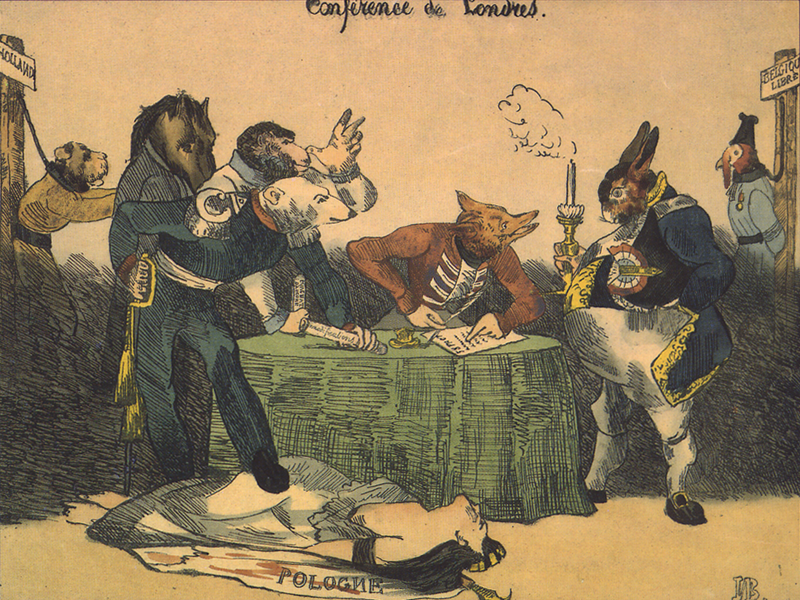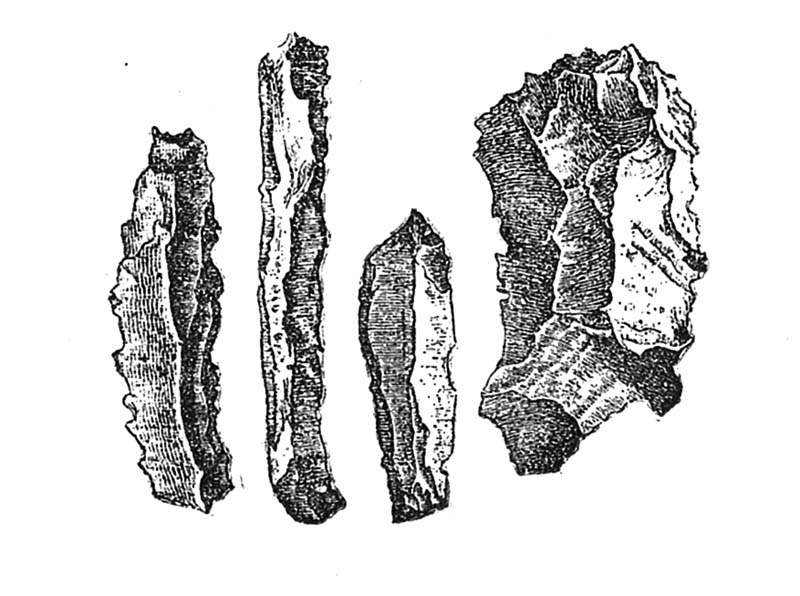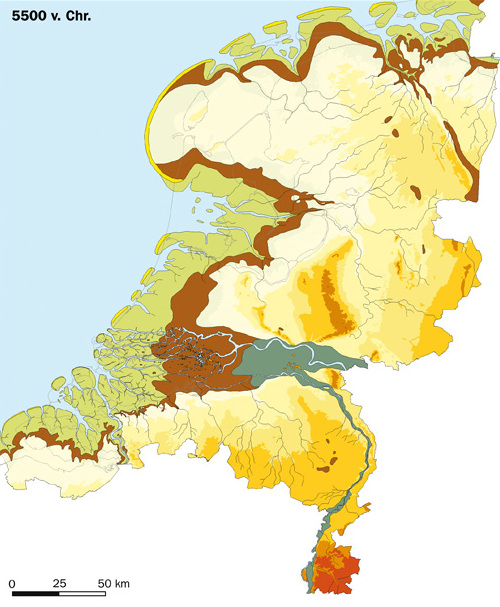|
London Conference Of 1830
The London Conference of 1830 brought together representatives of the five major European powers Austria, Britain, France, Prussia and Russia. At the conference, which began on 20 December, they recognized the success of the Belgian secession from the United Kingdom of the Netherlands and permanently guaranteed Belgian independence. Dutch response The Dutch were strongly opposed to Belgian independence, launching an (unsuccessful) invasion in 1831. Not until 1839 did the Dutch accept the decision of the London conference and recognize Belgian independence. Winners and losers Fishman says that the London Conference was "an extraordinarily successful conference" because it "provided the institutional framework through which the leading powers of the time safeguarded the peace of Europe". G. M. Trevelyan from a British standpoint called it "one of the most beneficent and difficult feats ever accomplished by our diplomacy"; while the French too saw their goal of an independent ... [...More Info...] [...Related Items...] OR: [Wikipedia] [Google] [Baidu] |
Belgian Revolution
The Belgian Revolution (, ) was the conflict which led to the secession of the southern provinces (mainly the former Southern Netherlands) from the United Kingdom of the Netherlands and the establishment of an independent Kingdom of Belgium. The people of the south were mainly Flemings and Walloons. Both peoples were traditionally Roman Catholic as contrasted with Protestant-dominated (Dutch Reformed) people of the north. Many outspoken liberals regarded King William I's rule as despotic. There were high levels of unemployment and industrial unrest among the working classes. On 25 August 1830, riots erupted in Brussels and shops were looted. Theatregoers who had just watched the nationalistic opera ''La muette de Portici'' joined the mob. Uprisings followed elsewhere in the country. Factories were occupied and machinery destroyed. Order was restored briefly after William committed troops to the Southern Provinces but rioting continued and leadership was taken up by radicals, w ... [...More Info...] [...Related Items...] OR: [Wikipedia] [Google] [Baidu] |
United Kingdom Of The Netherlands
The United Kingdom of the Netherlands ( nl, Verenigd Koninkrijk der Nederlanden; french: Royaume uni des Pays-Bas) is the unofficial name given to the Kingdom of the Netherlands as it existed between 1815 and 1839. The United Netherlands was created in the aftermath of the Napoleonic Wars through the fusion of territories that had belonged to the former Dutch Republic, Austrian Netherlands, and Prince-Bishopric of Liège in order to form a buffer state between the major European powers. The polity was a constitutional monarchy, ruled by William I of the House of Orange-Nassau. The polity collapsed in 1830 with the outbreak of the Belgian Revolution. With the ''de facto'' secession of Belgium, the Netherlands was left as a rump state and refused to recognise Belgian independence until 1839 when the Treaty of London was signed, fixing the border between the two states and guaranteeing Belgian independence and neutrality as the Kingdom of Belgium. Background Before the French ... [...More Info...] [...Related Items...] OR: [Wikipedia] [Google] [Baidu] |
History Of Belgium
The history of Belgium extends before the founding of the modern state of that name in 1830, and is intertwined with those of its neighbors: the Netherlands, Germany, France and Luxembourg. For most of its history, what is now Belgium was either a part of a larger territory, such as the Carolingian Empire, or divided into a number of smaller states, prominent among them being the Duchy of Brabant, the County of Flanders, the Prince-Bishopric of Liège, the County of Namur, the County of Hainaut and the County of Luxembourg. Due to its strategic location as a country of contact between different cultures, Belgium has been called the "crossroads of Europe"; for the many armies fighting on its soil, it has also been called the "battlefield of Europe" or the "cockpit of Europe". It is also remarkable as a European nation which contains, and is divided by, a language boundary between Latin-derived French and Germanic Dutch. Belgium's modern shape can be traced back at least as far ... [...More Info...] [...Related Items...] OR: [Wikipedia] [Google] [Baidu] |
History Of The Netherlands
The history of the Netherlands is a history of seafaring people thriving in the lowland river delta on the North Sea in northwestern Europe. Records begin with the four centuries during which the region formed a militarized border zone of the Romans in the Netherlands, Roman Empire. This came under increasing pressure from Germanic peoples moving westwards. As Roman power collapsed and the Middle Ages began, three dominant Germanic peoples coalesced in the area, Frisians in the north and coastal areas, Dutch Low Saxon, Low Saxons in the northeast, and the Franks in the south. During the Middle Ages, the descendants of the Carolingian dynasty came to dominate the area and then extended their rule to a large part of Western Europe. The region nowadays corresponding to the Netherlands therefore became part of Lower Lorraine, Lower Lotharingia within the Frankish Holy Roman Empire. For several centuries, lordships such as Duchy of Brabant, Brabant, County of Holland, Holland, Zeeland ... [...More Info...] [...Related Items...] OR: [Wikipedia] [Google] [Baidu] |
Sir Edward Goschen, 1st Baronet
Sir William Edward Goschen, 1st Baronet, (18 July 1847 – 20 May 1924) was a British diplomat. Background and education Goschen was born at Eltham, England, the twelfth child and sixth son of Wilhelm Heinrich Göschen, originally of Leipzig, Saxony, and Henrietta Ohmann, who was born in London. At the time of his birth his father was 54. The Liberal Unionist politician Lord Goschen was Goschen's elder brother. He was educated at Rugby and Corpus Christi College, Oxford. He twice represented Oxford at real tennis, played five matches of first-class cricket as a right-handed batsman for the University of Oxford and throughout his life was a keen sportsman. Diplomatic service Goschen entered the Diplomatic Service in 1869 and after an initial few months at the Foreign Office he served in Madrid, as Third Secretary in Buenos Aires, Paris, Rio de Janeiro, Constantinople, Peking, Copenhagen as secretary to the legation (1888–1890), Lisbon as secretary to the legation, Washington ... [...More Info...] [...Related Items...] OR: [Wikipedia] [Google] [Baidu] |
Treaty Of The Eighteen Articles
The Treaty of the Eighteen Articles was a proposal for a treaty between Belgium and the Netherlands to establish borders between the two countries. The initial proposal was finalised in London on 26 June 1831. Background The Belgian Revolution of 1830 challenged the territorial settlement of the Congress of Vienna, and - with French support for Belgium, but the opposition of the other continental Great Powers - threatened another continent-wide war. A conference was therefore organised in London, where France and England took the lead in arbitrating a solution. Outcome Among the more controversial issues debated in London 1830-1 were the financial settlement between the newly independent Belgium and Holland, and the territorial issue, with the disposal of Luxemburg and Limburg being especially inflammatory elements. Though the Treaty of Eighteen Articles (as set out in July 1831) was accepted by Belgium, it failed due to the resistance of the Dutch monarch William I, who swif ... [...More Info...] [...Related Items...] OR: [Wikipedia] [Google] [Baidu] |
Belgian Revolution
The Belgian Revolution (, ) was the conflict which led to the secession of the southern provinces (mainly the former Southern Netherlands) from the United Kingdom of the Netherlands and the establishment of an independent Kingdom of Belgium. The people of the south were mainly Flemings and Walloons. Both peoples were traditionally Roman Catholic as contrasted with Protestant-dominated (Dutch Reformed) people of the north. Many outspoken liberals regarded King William I's rule as despotic. There were high levels of unemployment and industrial unrest among the working classes. On 25 August 1830, riots erupted in Brussels and shops were looted. Theatregoers who had just watched the nationalistic opera ''La muette de Portici'' joined the mob. Uprisings followed elsewhere in the country. Factories were occupied and machinery destroyed. Order was restored briefly after William committed troops to the Southern Provinces but rioting continued and leadership was taken up by radicals, w ... [...More Info...] [...Related Items...] OR: [Wikipedia] [Google] [Baidu] |
1830 In Belgium
Events in the year 1830 in Belgium. Incumbents :Monarch: William I of the Netherlands (to 4 October) Events ;August * 25 August – Belgian Revolution begins ;September * 24 September – Provisional Government of Belgium formed ;October * October – Garde Civique formed to maintain public order * 4 October – Provisional government proclaims Belgian independence. William Henry Overall, ''The dictionary of chronology, or historical and statistical register'' (London, 1870), p. 76. * 17 October – Decree of the provisional government prohibiting importation of jenever from the Netherlands. * 27 October – Belgian forces take Antwerp; Dutch forces bombard the city from Antwerp Citadel. ;November * 3 November – Elections for the National Congress of Belgium held. * 10 November – First session of the National Congress of Belgium. * 25 November – Étienne-Modeste Glorieux founds the fraternity in Ronse that would eventually become the Brothers of Our Lady of Lourdes ... [...More Info...] [...Related Items...] OR: [Wikipedia] [Google] [Baidu] |
1830 In The Netherlands
Year 183 (Roman numerals, CLXXXIII) was a common year starting on Tuesday (link will display the full calendar) of the Julian calendar. At the time, it was known as the Year of the Consulship of Aurelius and Victorinus (or, less frequently, year 936 ''Ab urbe condita''). The denomination 183 for this year has been used since the early medieval period, when the Anno Domini calendar era became the prevalent method in Europe for naming years. Events By place Roman Empire * An assassination attempt on Emperor Commodus by members of the Roman Senate, Senate fails. Births * January 26 – Lady Zhen, wife of the Cao Wei state Emperor Cao Pi (d. 221) * Hu Zong, Chinese general, official and poet of the Eastern Wu state (d. 242) * Liu Zan (Zhengming), Chinese general of the Eastern Wu state (d. 255) * Lu Xun (Three Kingdoms), Lu Xun, Chinese general and politician of the Eastern Wu state (d. 245) Deaths References {{DEFAULTSORT:183 183, ... [...More Info...] [...Related Items...] OR: [Wikipedia] [Google] [Baidu] |
Separatism In Belgium
Separatism is the advocacy of cultural, ethnic, tribal, religious, racial, governmental or gender separation from the larger group. As with secession, separatism conventionally refers to full political separation. Groups simply seeking greater autonomy are not separatist as such. Some discourse settings equate separatism with religious segregation, racial segregation, or sex segregation, while other discourse settings take the broader view that separation by choice may serve useful purposes and is not the same as government-enforced segregation. There is some academic debate about this definition, and in particular how it relates to secessionism, as has been discussed online. Separatist groups practice a form of identity politics, or political activity and theorizing founded in the shared experiences of the group's members. Such groups believe attempts at integration with dominant groups compromise their identity and ability to pursue greater self-determination. However, econo ... [...More Info...] [...Related Items...] OR: [Wikipedia] [Google] [Baidu] |
Separatism In The Netherlands
Separatism is the advocacy of cultural, ethnic, tribal, religious, racial, governmental or gender separation from the larger group. As with secession, separatism conventionally refers to full political separation. Groups simply seeking greater autonomy are not separatist as such. Some discourse settings equate separatism with religious segregation, racial segregation, or sex segregation, while other discourse settings take the broader view that separation by choice may serve useful purposes and is not the same as government-enforced segregation. There is some academic debate about this definition, and in particular how it relates to secessionism, as has been discussed online. Separatist groups practice a form of identity politics, or political activity and theorizing founded in the shared experiences of the group's members. Such groups believe attempts at integration with dominant groups compromise their identity and ability to pursue greater self-determination. However, econo ... [...More Info...] [...Related Items...] OR: [Wikipedia] [Google] [Baidu] |

.jpg)


.jpg)